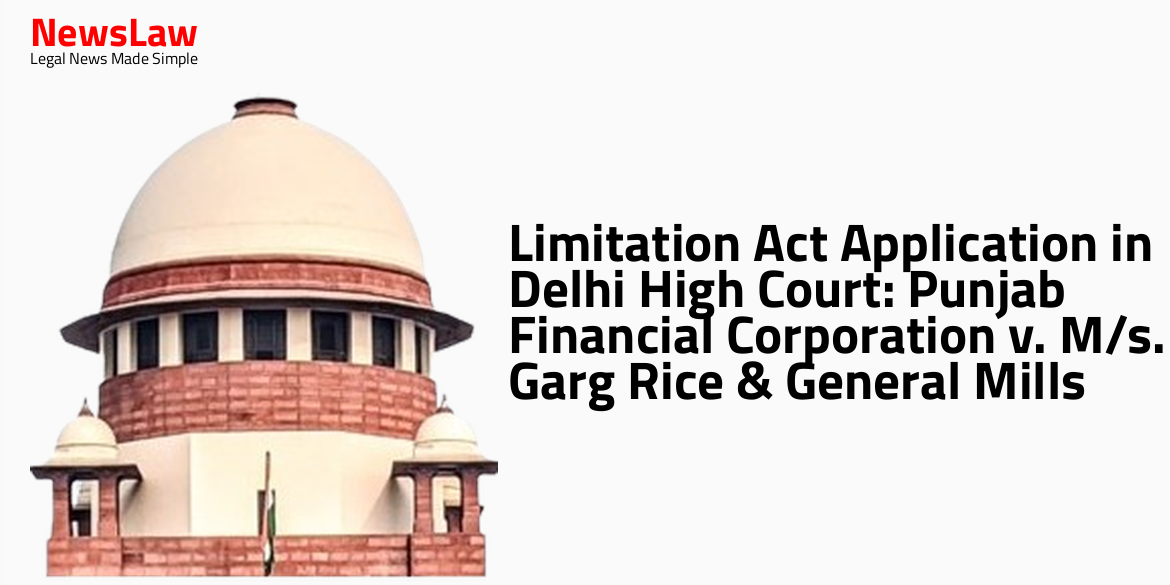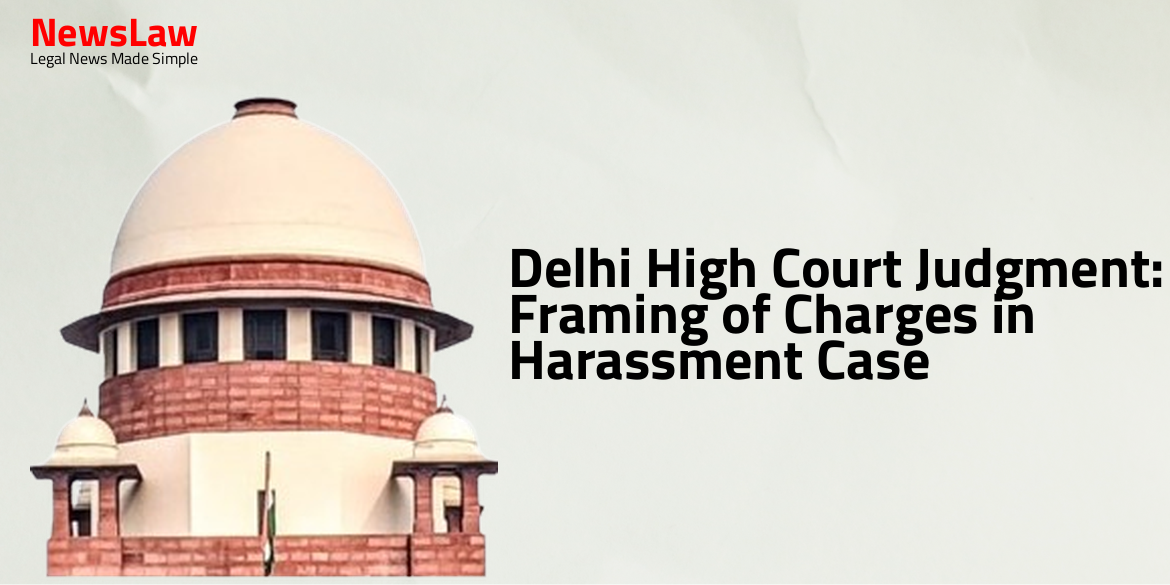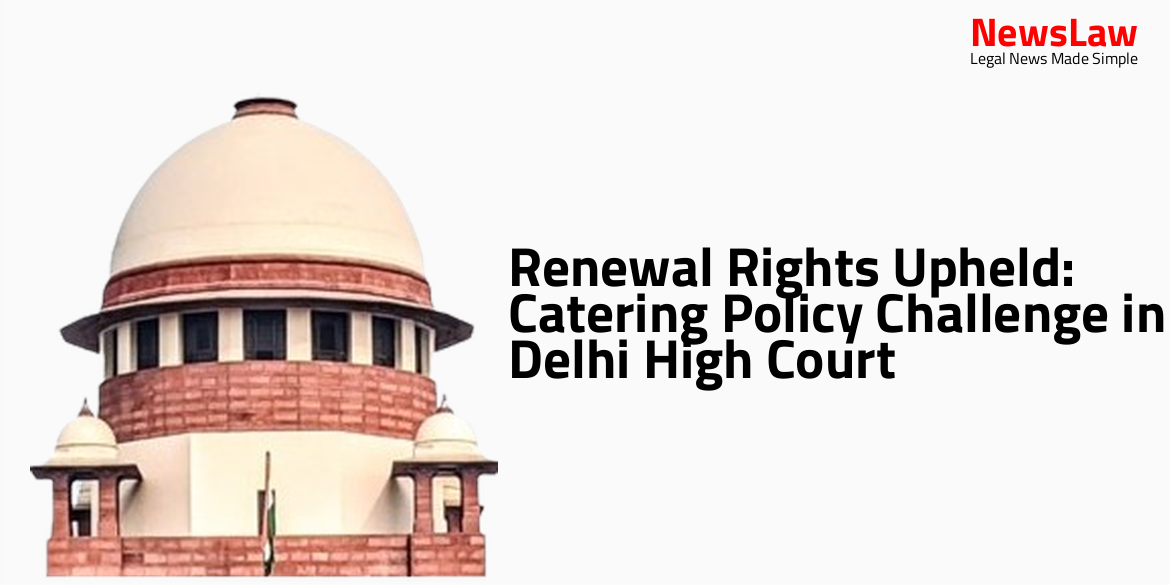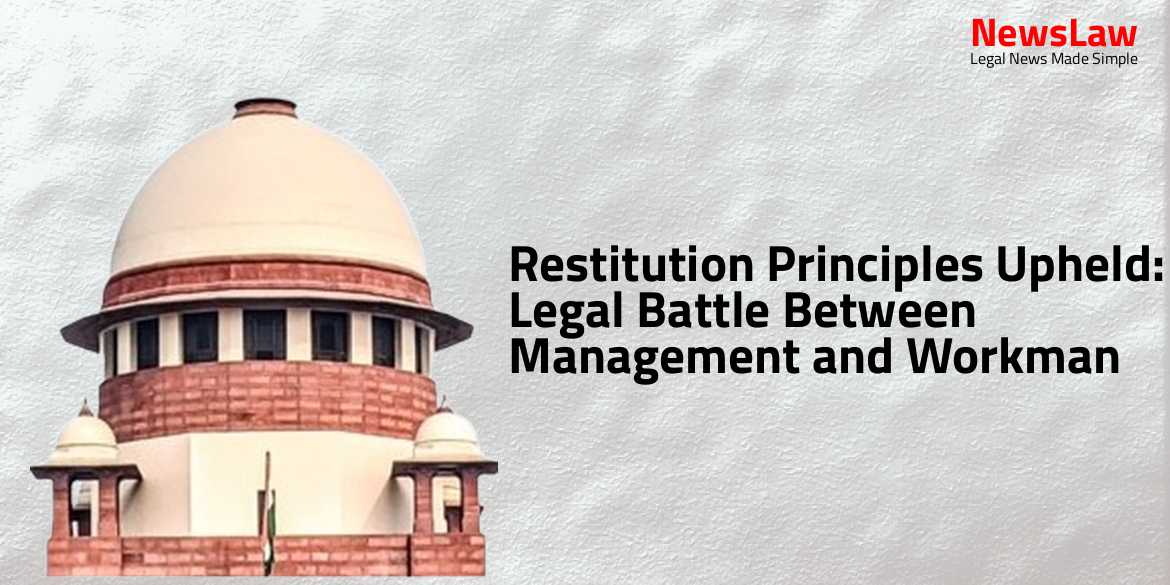A significant ruling by Delhi High Court sheds light on the application of the Limitation Act in a case involving Punjab Financial Corporation and M/s. Garg Rice & General Mills. The judgment delves into the complexities of time limitations in legal proceedings and sets a precedent for future cases. Let’s explore the implications of this decision in the realm of legal practice.
Facts
- The proceedings stem from an arbitral award dated 10 January 2004 between Kotak Mahindra Bank and Ram Babu, the father of the appellants.
- Objections were raised against the necessity of re-sale, resulting in the sale on 31 October 2005 being deemed null and void.
- The objections were dismissed not on merits but due to non-prosecution, as a copy was not supplied to the counsel for the auction purchaser.
- A review application was filed but was also dismissed on 17 April 2009.
- The objections were dismissed as non-prosecution, confirming the auction sale and the issuance of a certificate of sale to the auction purchaser.
- The property worth Rs 35 lacs was sold for Rs. 15,70,000, leading to a discrepancy.
- Notice was issued to respondents for the appeal and stay of possession delivery proceedings subject to a deposit of Rs. 15,70,000 within six weeks.
- Objections were filed post-auction sale proceedings, which were dismissed by the concerned court.
- Objecting beyond the prescribed period of limitation raises issues of condonation of delay as per Section 5 of the Limitation Act, 1963.
- The objections filed on 25.01.2008 were time-barred, as they were not within 60 days from 17.07.2007.
Arguments
- Ms. Dhawan, arguing for the Petitioner, relies on the decision of a learned Single Judge of Punjab and Haryana High Court in Punjab Financial Corporation, Chandigarh v. M/s. Garg Rice & General Mills, Samana.
- The Petitioner’s reliance is based on the dismissal of cases arising from Ex. FA 5/2009 in a judgment passed on 22nd November 2011.
- Mr. Kaushik Mishra, representing the Respondent, refers to the settled issue in controversy through judgments of the Supreme Court in Damodaran Pillai v. South Indian Bank Ltd. and Aarifaben Yunusbhai Patel v. Mukul Thakorebhai Amin.
- Fraud does not vitiate everything and a decision based on fraud can be subjected to limitation.
- In absence of express power, civil courts cannot condone delay.
- Court cannot invoke its inherent power for condonation of delay if Section 5 of the Limitation Act does not apply.
Analysis
- The issue in controversy in FAO 240/2005 was distinct from the objection application, so the time spent in prosecuting FAO 240/2005 could not be excluded from the limitation period for filing objections.
- Article 127 of the Limitation Act prescribes a 60-day period for setting aside a property sale in execution of a decree, and Section 5 of the Act does not apply to such proceedings.
- The court cannot rewrite parliamentary statutes, and limitations must be abided by in execution proceedings.
- Failure to comply with rules like depositing auction purchase money within 15 days can vitiate the auction sale.
- Objections in the present case were time-barred, hence not maintainable under Section 5 of the Limitation Act.
- The objection application matter and the FAO 240/2005 matter were completely different, hence Section 5 of the Limitation Act could not be applied.
- The court intended the objections to be decided on merits, not just on grounds of limitation.
- The auction sale being vitiated by fraud or irregularity does not exempt it from the limitation period under Article 127 of the Limitation Act.
- The issue of the non-applicability of the Limitation Act to proceedings has been settled by the judgment in Damodaran Pillai and Aarifaben Yunusbhai Patel.
- Rule 90 of the CPC allows challenges to the sale of property in an auction based on material irregularity or fraud.
- Section 5 of the Limitation Act excludes cases under Section 21 of the CPC from its ambit, which relates to the filing of applications.
- In the given case (F.A. 5/2009), an ex-parte award of Rs.8 lakhs with interest was passed against the appellant by the Arbitrator in October 2005.
- The appellant filed objections under Section 34 of the Arbitration and Conciliation Act upon becoming aware of the award.
- Any appeal or application may be admitted after the prescribed period if sufficient cause is shown.
- An immovable property sold in execution of a decree can be set aside on grounds of irregularity or fraud.
- Sale cannot be set aside unless substantial injury is proven.
- No application to set aside a sale can be entertained if the ground could have been taken before the date of proclamation of sale.
- Limitation for filing an application to set aside a sale is 60 days as per Article 127 of the Limitation Act, 1963.
- The learned ADJ rejected the prayer for condonation of delay under Section 5 of the Limitation Act and exclusion under Section 14 of the Limitation Act.
- FAO 240/2005 was erroneously treated as an appeal under Section 37 of the Arbitration Act.
- The matter in issue in FAO 240/2005 differs from the matter in issue in the Objection Application filed.
Decision
- Learned ADJ’s decision is confirmed in its entirety
- The appeal is dismissed
- No orders as to costs
Case Title: HARISH BODH & ANR Vs. KOTAK MAHINDRA BANK & ANR (2024:DHC:3801)
Case Number: EX.F.A.-2/2019



